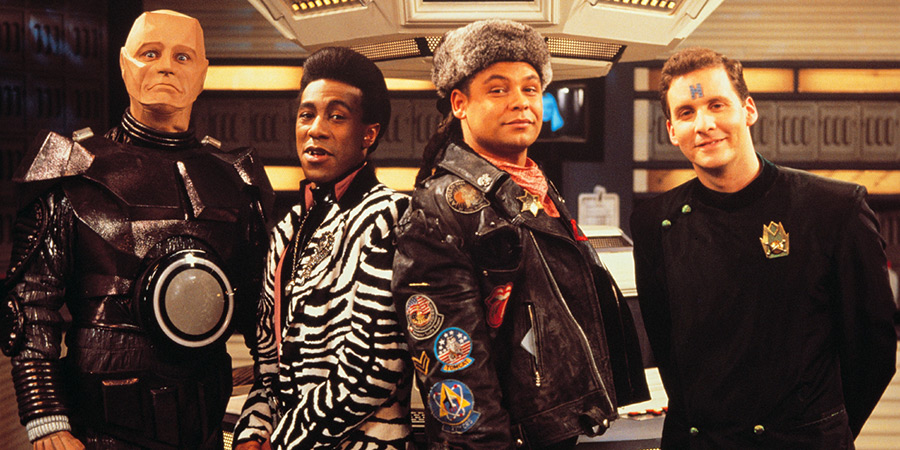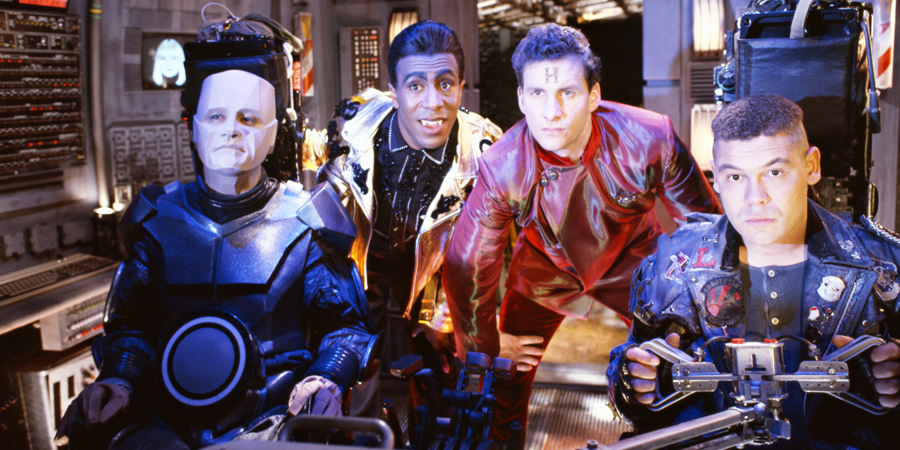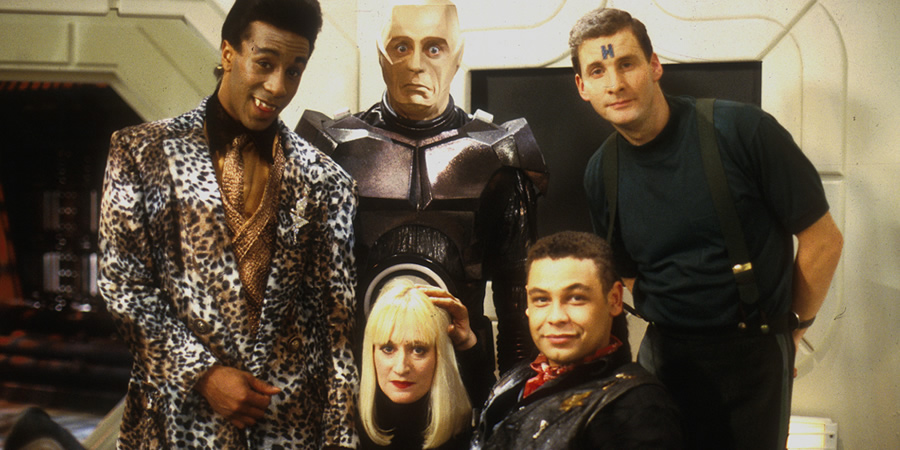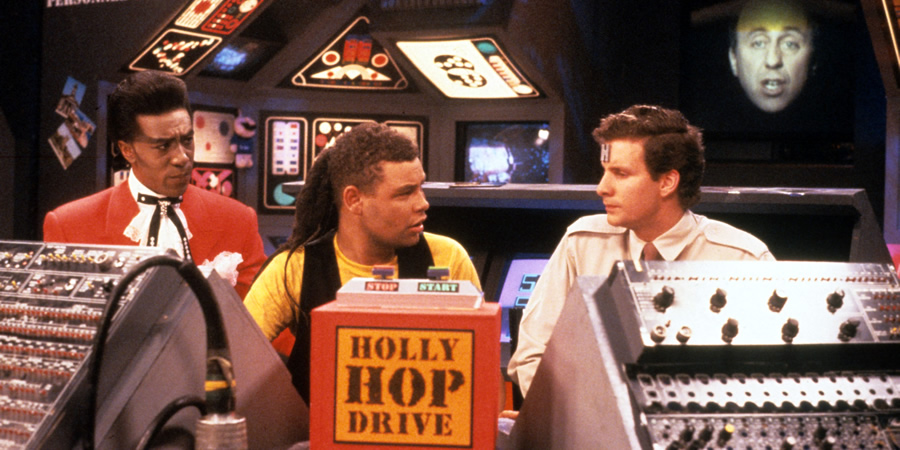
Ultimate Lister: Tom Salinsky takes a deep-dive into Red Dwarf

Not all heroes wear capes, or Jupiter Mining Corp jumpsuits. Take Tom Salinsky, who has embarked on several sci-fi journeys recently that make you want to double-hand salute him.
His new book Red Dwarf: Discovering the TV Series, is an epic bingewatch of the show that's proving harder to kill than Schwarzenegger's Terminator. There's a lot of it to get through: that ambitious sitcom debuted way back in 1988 and makes yet another comeback next year, after a dozen seasons and several specials. Still, this first volume - covering Series 1 to 6, including alternate versions - is the sort of book people usually do about The Beatles, or Bob Dylan, not Chris Barrie and co.

The author has form though - his previous work was a similar deep (space) dive into Star Trek - and he really works his way into those wormholes. Each series of Dwarf is given a thorough scene-setting making-of intro, and every episode gets the full treatment: viewing figures, critical appraisal, guest stars, remastered bits, best gags, worst special effects. You don't get that with Dylan discographies.
So, let's launch our own probe into his megawatch - or, indeed, smegawatch.
What made you do a Red Dwarf deep-dive?
This book grew out of the Star Trek book which in turn grew out of a podcast. I do like a project, and I had recently completed a three-year-plus mission to watch every movie which had won Best Picture at the Academy Awards (this was the podcast Best Pick with John Dorney and Jessica Regan).
When that wrapped up, I had some extra time on my hands, and it occurred to me to wonder how long it would take me to watch all of Star Trek. Having discovered that everything from Kirk to Archer [from the show Star Trek: Enterprise] could be polished off in two years, at the rate of one episode a day, I decided to do that, and then the opportunity came to turn that into a book.
Once that commission came in, I asked if the publisher would like a Red Dwarf book too. No-one's ever done a proper critical analysis of Red Dwarf and most of the episode guides that exist only go up to Series VIII (some only go up to Series VI), so I felt there would be a gap in the market.
How long did it take to research and write? Am I right in thinking you watched the versions with contributor commentaries too?
I started in July 2022 and delivered the manuscript in May 2023.
And yes, this did involve watching several episodes multiple times, not least the very first episode where I watched the transmitted version, the transmitted version with cast commentary, the transmitted version with commentary from Doug Naylor and director Ed Bye, the remastered version, the remastered version with commentary from Ed Bye and colleagues, the first edit, the first edit with commentary from Rob and Doug, and the YouTube lockdown commentary with Rob, Ed Bye and producer Paul Jackson.
You could probably read the whole book in the time that took me. The same material is also covered in comic strip form and in the first Red Dwarf novel. A Japanese dub is included on one of the DVD releases, but I didn't think I would benefit greatly from watching that as well.

What do your nearest and dearest make of these epic endeavours? Is everyone else heartily sick of Red Dwarf in your household?
The 74 episodes of Red Dwarf, even watched multiple times, fitted in and around other activities without too much domestic stress. The schedule for Star Trek watching was tighter - one episode a day, come hell or high water.
When I explained the plan to my wife, she asked "Do I have to watch them too?" "No," I replied. "Fine," she said. "You can if you want..." I suggested. She rolled her eyes. "You're on something like your fifth re-watch of Friends," I pointed out. "Yes, but I'm just watching random episodes to help me get to sleep. I'm not checking each one off on a spreadsheet and giving each one a star rating." "Right. So, what's the point..?"
I enjoyed the viewership stats - is Red Dwarf a bit unsung, given its longevity? Should it be up there with Steptoe, Only Fools, etc?
Do you know, those were very difficult to discover for the early series. Publications like The Times and Broadcast which you can find in the British Library used to give weekly channel top tens, but Red Dwarf wasn't always in the top ten. Eventually, I got access to the BBC Written Archives in Caversham where there was only a modest amount of paperwork, but they did have the original BARB reports for the years in question, and so I was finally able to plug all the gaps.
I'd love it to be mentioned in the same breath as Only Fools And Horses - it's put out more episodes and it ran for longer. But it can't be denied that hoping that the next gamble will pay off is marginally more relatable than trying to rewrite time so that the bonkers cyborg which has erased you from reality will itself be erased from reality. Science fiction, especially television science fiction, tends to attract a niche audience.

Why do you think it has endured? Is there a bigger foreign audience than for most UK sitcoms?
I think a lot of it is due to the tenacity of Doug Naylor and the enthusiasm of the cast. Even now, 36 years after the first episode aired, Naylor still seems to be full of ideas for new stories, and even if the cast are getting a bit creaky, they love playing these characters.
It did play well in America - although some of the references must have been pretty baffling. But if it's a bit niche here because it's a science fiction sitcom and there aren't very many of those; there it's a British science fiction sitcom which is even more niche. But I think science fiction comedy is a hard one to pull off.
Look at Avenue 5, which is basically Veep in Space, with genius producer Armando Iannucci at the helm and an amazingly stacked cast led by Hugh Laurie, Rebecca Front, Josh Gad, Zach Woods and Nikki Amuka-Bird. It got terrible ratings and was cancelled after two seasons. I rather enjoyed it.
You pick a Best Gag and Worst Visual Effect for each episode - what are your favourites, for both?
It's very hard to beat the very famous "Step up to red alert." "Sir, are you absolutely sure? It does mean changing the bulb" from Legion in Series VI for best gag. Worst visual effect is probably the awful Holly Hop Drive prop which is blatantly an empty cardboard box painted red.

Interesting to see the guest stars too, from Craig Ferguson and Koo Stark to Frances Barber and Timothy Spall - any other standouts for you?
Given that a lot of actors were needed for episode one, but all their characters were going to be killed off, during pre-production the writers idly wondered if they could get some really big stars to play these parts. Their fantasy casting included John Cleese, Ronnie Barker, Leonard Rossiter and even Sean Connery as the captain. They imagined the fun as the BBC Two audience watched all these familiar faces fall by the wayside, leaving only Craig "Who's He?" Charles left standing.
What's funny about this is that one of those discarded crewmembers is Mark Williams who is now hugely famous to two different fan groups - comedy fans know him from The Fast Show and to Harry Potter-heads he's Arthur Weasley.
We nearly had Graham Chapman. He was booked to be the host of Lifestyles of the Disgustingly Rich and Famous in the episode Timeslides (and his casting makes much more sense given that the American show being spoofed was hosted by British Robin Leach). His death prevented him from attending the pre-taping and director Ed Bye slotted his wife Ruby Wax into the role instead.
Are you deep into research for book two now? And after that - any other series you can obsess about?
Book two is all done - publishing moves very slowly. My attentions are now directed towards a play about the Labour Party which is coming to [London theatre] The Kings Head in May 2025 - The Gang of Three. But I wouldn't say no to an X-Files book or a Seinfeld book or a Buffy The Vampire Slayer book if anyone thought the demand was there...
Red Dwarf: Discovering the TV Series by Tom Salinsky is available to order now. More details below.
Help us publish more great content by becoming a BCG Supporter. You'll be backing our mission to champion, celebrate and promote British comedy in all its forms: past, present and future.
We understand times are tough, but if you believe in the power of laughter we'd be honoured to have you join us. Advertising doesn't cover our costs, so every single donation matters and is put to good use. Thank you.
Love comedy? Find out moreRed Dwarf - Discovering The TV Series: Volume I: 1988-1993

Red Dwarf is virtually unique among British sitcoms. It began in 1988 and was still airing new episodes in 2020, making it one of the longest running sitcoms of all time, but the core cast has remained largely unchanged. And its science fiction flavour contrasts strongly with the drawing rooms and sofas which were the norm when it launched, and the fast-cut mockumentary style which is popular today. And yet, this is a show which nobody wanted to make, and which only barely made it to our screens at all.
In this work, Tom Salinsky looks at exactly how it came to be; who was considered for the cast but didn't make it; how it was radically reinvented for the third, sixth, seventh, ninth and tenth series; how it survived the breakup of its key creative partnership, the loss of the original spaceship models, BBC strikes, the departure of a major cast member, and the seemingly self-defeating rules which the writers imposed on themselves.
But this isn't just a behind-the-scenes account. It's also a detailed critical analysis, examining why the best episodes succeed and why the less impressive episodes struggle, while also finding time to ask just how a hologram made of light can smell burning camphor wood, why a creature evolved from a cat is familiar with Wilma Flintstone, or just how long Lister and Kochanski were dating for.
How can all this possibly be contained in one book? It can't! Volume I will cover the first six series and Volume II will conclude the story of Red Dwarf on television as well as looking at the novels, comic strips, computer games and more.
First published: Monday 30th September 2024
- Publisher: White Owl
- Pages: 192
- Catalogue: 9781399034944
![]() Buy and sell old and new items
Buy and sell old and new items
Search for this product on eBay
BCG may earn commission on sales generated through the links above.
Red Dwarf - Discovering The TV Series: Volume II

A second volume from author Tom Salinsky, covering Red Dwarf's seventh TV series onwards, plus all the spin-offs in other media.
- Publisher: White Owl
BCG may earn commission on sales generated through the links above.

